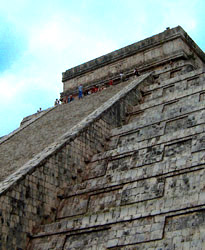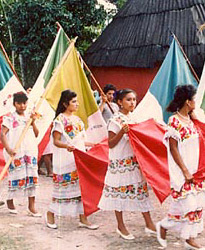|
OSEA Winter Quarter Program
January 5–March 23, 2005
The Winter Quarter Program offers interdisciplinary research in Cultural
Anthropology, Ethnographic Methods, México, Indigenous Peoples,
Development, Tourism, Archaeological Heritage Management, Maya Healing
and Medicine, Migration, Urbanism, Youth Culture, Multi-Media Research,
and the Anthropology of Art. Participants live in in Home Stays with
Bi-Lingual Spanish and Yucatec Maya Families.
Students whose home institution is partners with OSEA may able to
have concurrent enrollment. Concurrent
enrollment offers students the opportunity to retain the full
time student status and financial aid while participating in OSEA
Training Programs. Credit for OSEA courses appear on your regular
transcript as the equivalent courses offered by your anthropology
department (more information).
University of Washington students, click
here for information on concurrent enrollment.


Photographs: El Castillo at Chichén
Itzá and Community Event in Pisté
| OSEA
Course Offerings |
Hours
|
|
Seminar in Maya Anthropology
|
4 credits |
|
Seminar on Culture Concepts and Theories |
3 credits |
|
Seminar on Ethnographic Research and Fieldwork Methods |
5 credits |
|
Speaking Spanish and Yucatec Maya for Ethnographic Research |
4 credits |
|
Total Available Credit Hours |
Up to 16 |
| Program
Costs |
Tuition, Winter Quarter
|
$3,200 |
| Living and Activities
Fee |
$1,550 |
| TOTAL PROGRAM COSTS |
$4,750 |
| |
| ADDITIONAL COSTS |
| Estimated Travel &
Flight |
$450–550 |
| Books |
$150 |
| Personal Supplies and
Extra On-Site Expenses |
$300 |
| Student Insurance from
Family or Home Institution |
variable |
| Suggested Research Equipment,
if available to student NOT required to purchase
|
[e.g.,
photographic camera, camcorder, laptop, standard-size cassette
recorder] |
See the Tuition & Fees page for additional
information on the tuition and fee schedule.
Educational Excursions
The course schedule includes trips to or tours to major tourism and
archaeological heritage sites. Students are given ethnography assignments
during these experiences.
|



